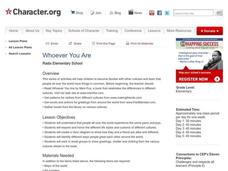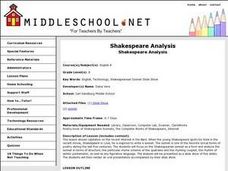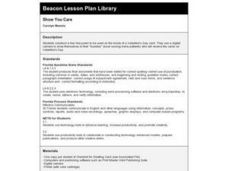Curated OER
Edward Lear, Limericks, and Nonsense: There Once Was?
Students explore limericks. In this poetry writing lesson plan, students listen to and read a variety of poems written by Edward Lear. Students count syllables and identify meter by clapping as they read aloud. Students complete a...
Curated OER
Lessons of the Indian Epics: Following the Dharma
Students examine how the epic poem, "Ramayana" teaches dharma, one of Hinduism's most important tenets. They read the abridged version of the "Ramayana," identify the main plot points, complete a chart, and write an essay on a moral...
Curated OER
The Voices Within Theirs and Mine
Students create new words to convey their thoughts. They find, list and discuss the poetic devices used by the poet in creating his or her war poem and create their own war poems. They use sensory perception words and memory in...
Curated OER
Writing About Time: My Favorite Times
Start by clicking on the icon that says, "Download the Activity." The format is much easier to read and understand here! Then, encourage your class to write about some of their favorite things through a three-paragraph essay. Examples...
Curated OER
Whoever You Are
Students examine cultures, traditions, and feeling throughout cultures. In this cultural lesson, students use literature, maps, and cultural information to examine how people have universal feelings despite their different cultures and...
Curated OER
Cluing into Symbols Robert Frost
Students use the Internet and video to discover how find evidence in poetry in order to discover the theme(s) of the poems. They are able to define poetic devices like simile, metaphor and repetition. Students identify themes in...
Curated OER
A Prelude To Beowulf
Students study the literature and literary techniques of the early Middle Ages, thus preparing students to read Beowulf with an appreciation for its artistry and beauty. Students solve online riddles, write riddles and study Anglo-Saxon...
Curated OER
Let's Fly Our Kites
Students practice reading and writing using a short poem and information about kites. In this kite poem lesson plan, students read and write using a common poem. This lesson plan includes practice with reading, rhyming, handwriting,...
Curated OER
Emerging Heroes
Twelfth graders define what a hero is and watch a video. In this hero lesson, 12th graders discuss the characteristics of a hero and list heroes and their attributes. Students read the poem Beowulf and identify characteristics of its...
Curated OER
Writing
Learners write poems and a narrative story. In this writing activity, students read stories and poems written by other learners and read examples of haiku's and diamonte's. Students write an acrostic poem and a diamonte poem. Learners...
Curated OER
Show Don't Tell
Students review the Show Don't Tell method of writing haiku poetry. They practice distinguishing poetic language from academic language and create poems based on images, not explanations.
Curated OER
Analyzing Poetic Devices: Robert Hayden's "Those Winter Sundays" and Theodore Roethke's "My Papa's Waltz"
Students examine how Robert Hayden and Theodore Roethke incorporate poetic devices to convey meaning in the poems, 'Those Winter Sundays,' and 'My Papa's Waltz.' They listen to audio clips, explore websites, and write an analysis of the...
National Endowment for the Humanities
Charles Baudelaire: Poète Maudit (The Cursed Poet)
After learning the main ideas of the Decadent movement, learners work in small groups to read and translate poems by the French poet Charles Baudelaire using basic etymology skills. They then read the accurate English translations to see...
Curated OER
Comparing The Odyssey and "The Lotus Eaters"
Ninth graders compare the development of text in Book 5 of "The Odyssey" to Alfred Lord Tennyson's poem "The Lotus Eaters." After discussing the comparison's of the two text within a group, they create an original piece of work or...
Curated OER
Shakespeare Analysis
Eighth graders focus on the Shakespearian sonnet as a form and analyze the sonnet in terms of structure, the particular rhyme scheme of the quatrains and the rhyming couplet, the rhythm of iambic pentameter, as well as any figurative...
Curated OER
Beowulf
Students read the epic, Beowulf and examine the nature of good and evil. They compile a list of questions about loyalty tests and take turns asking and answering them. they create Beowulf comic strips and research other epic tales.
Curated OER
- Making Metaphors with Munchies
Students brainstorm independently first, then ask their best friend on the team, or seat partners, depending on the year & student mix, to add to their list of personal characteristics and/or to name three words they think of...
Curated OER
Show You Care
Students construct a four-line poem to be used on the inside of a Valentine's Day card. They use a digital camera to show themselves to their "buddies" (local nursing home patients) who receive the cards on Valentine's Day.
Curated OER
Gyotaku Lesson Plan
Young scholars study the Japanese art of fish painting called Gyotaku while examining the lifestyle of Japanese fishermen at the end of the Edo period. They make a Gyotaku fish print and write a haiku poem using the proper number of...
Curated OER
Heaven or Ground Hog Day?
Learners discover the ideas of enlightenment by reading historical poetry. In this philosophical lesson, students read poems by Sir Walter Scott and Sergeant Joyce Kilmer while discussing the themes of the writing with classmates....
Curated OER
Letter L
Young scholars will have fun learning about the letter "L" with the activities in this lesson plan. The author suggests reading "Lightning Bug" from the McGraw-Hill reading book. However, you may find other poems that are fitting for...
Curated OER
Do You Haiku? We Do!
Third graders try their hands at writing Haiku, a form of Japanese poetry. Haiku is usually 17 syllables in three-line form. This engaging lesson has many excellent worksheets and website imbedded in the plan. They share their finished...
Curated OER
The Sonnet Challenge
High schoolers are given information about two popular sonnet forms-English and Italian. They are given the rules for writing a sonnet. Students are asked what type of sonnet they would use. They are each given a sheet of paper and...
Facing History and Ourselves
What Shapes Your Identity?
Sixth graders explore their individual identities. In this personal identity instructional activity, 6th graders write biopoems using the provided template. Students share their poems and respond to the poetry shared.

























